
| Summer 2013/2014 |
| Title |
High-performance buildings : a guide for owners & managers
|

|
| Author | Robinson, Tony | |
| Call Number | TH880.R65 2014 | |
|
This book provides a blueprint for action for readers making decisions about how to improve the energy efficiency and performance of new or existing buildings. Suitable for both seasoned veterans and new managers, it takes an objective and orderly approach to what is often a complex, costly, and time-consuming process. The book presents fundamental principles illustrated with case studies. It thoroughly covers the topics in a concise, technically accurate way. The book is designed for architects, engineers, and construction managers.
|
||
| Title |
Fundamentals of crisis counseling
|

|
| Author |
Miller , Geraldine A.
|
|
| Call Number | RC480.6.M48 2012 | |
|
An indispensable handbook for assisting clients in crisis and in their journey toward healing Integrating practical training with both research and theory, it offers students and professionals proven hands-on techniques to assist clients in recovery from crisis and towards an eventual return to their day-to-day lives. This guide is filled with lessons on current evidence-based counseling, how to operate as a client stress manager, and information on finding resources that facilitate client resilience. In addition, the author helps counselors improve counseling effectiveness by gaining a better understanding of their own strengths and weaknesses and emphasizes the importance of self-care.
|
||
| Title |
The people want : a radical exploration of the Arab uprising
|

|
| Author |
Achcar , Gilbert
|
|
| Call Number | JQ1850.A91A33613 2013 | |
|
Simplistic interpretations of the uprising that has been shaking the Arab world since a young street vendor set himself on fire in Central Tunisia, on 17 December 2010, seek to portray it as purely political, or explain it by culture, age, religion, if not conspiracy theories. Instead, Gilbert Achcar locates the deep roots of the upheaval in the specific economic features that hamper the regionís development and lead to dramatic social consequences, including massive youth unemployment. Intertwined with despotism, nepotism, and corruption, these features, produced an explosive situation that was aggravated by post-9/11 U.S. policies. The sponsoring of the Muslim Brotherhood by the Emirate of Qatar and its influential satellite channel, Al Jazeera, contributed to shaping the prelude to the uprising. But the explosionís deep roots, asserts Achcar, mean that what happened until now is but the beginning of a revolutionary process likely to extend for many more years to come.
|
||